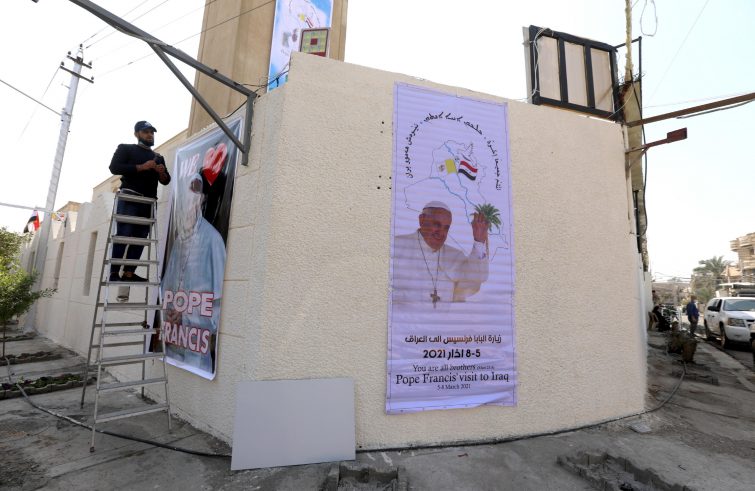
It is the first ever papal visit to Iraq and the first to a country with a Shiite majority. It represents a meaningful step as it “initiates a dialogue with the second largest denomination in the Muslim world after the larger Sunni denomination, of which Imam al-Tayyeb of al-Azhar University in Cairo is a leading moral authority.” Msgr. Piero Coda, coordinator of the Department of Theology, Philosophy and Human Sciences at Sophia University Institute in Loppiano, member of the International Theological Commission, explains the reasons behind Pope Francis’ decision to turn a new page in the dialogue with Islam. In 2016 a dialogue project involving Christian and Muslim Shia students was launched in Loppiano under the coordination of Msgr. Coda and Dr. Muhammad Shomali of the Risalat Institut in Qom, named “Wings of Unity” by its promoters. “Shiite Islam – explains the theologian – is rooted in Islam’s earliest identity and has as its reference point the city of Najaf, the burial place of Ali, considered the first Imam by Shiite tradition who faithfully preserved the Prophet’s legacy. Pope Francis’ visit to the city of Najaf and the planned meeting with Grand Ayatollah al-Sistani will no doubt set the cornerstones of another privileged bridge of dialogue with the Islamic world.”
 Navigating these worlds, large in geographical size yet internally divided, is not easy. What strategy is Pope Francis pursuing in unlocking these doors?
Navigating these worlds, large in geographical size yet internally divided, is not easy. What strategy is Pope Francis pursuing in unlocking these doors?
The Pope’s guiding inspiration stems from the Second Vatican Council with a landmark event in 1986, when John Paul II called the first World Day of Prayer for Peace in Assisi with world religious leaders.
We are now entering a new phase that entails mutual recognition and practical cooperation in the spirit of fraternity, justice and peace.
The Pope pursues an inspiring approach with two main qualities: firstly, a peace strategy based on gratuitous and open-hearted openness to all. It is the strategy of St Francis in his meeting with the Sultan in the Holy Land, seeking not immediate gain but constructive witness to the message of human fraternity enshrined in the Gospel. The second quality of this strategy is that no one is excluded, all doors are open, it reaches out to all and thus encourages reconciliation even among the different traditions of the Islamic world. There are indeed different sensitivities also within the Shiite world. However, if they are all reached by the Pope’s message of peace and brotherhood, they can all be encouraged to embrace the possibility of encounter and the construction of a world shaped by universal fraternity.
This visit will bring the Pope to the heart of the Middle East and in a land bathed in blood. To what extent can Francis and his meetings with the great religious leaders influence the geopolitical arena of this region?
They send out a strong message that hope and dedication to human fraternity and peace are the only winning strategies. A spiritual movement must arise from the grassroots, from the conscience of the people, in order to rebuild the fabric of societies that have been devastated by war and hate. I believe that the Pope’s gestures of dialogue and encounter also represent a clear reminder to all those governing national destinies that it is no longer possible, it is anti-historical as well as inhuman, to surrender to or even promote a culture of war and enmity, dictated by power interests and economic hegemony.
It is a call to lay down arms and embrace effective and far-sighted instruments of peace, justice and fraternity. The Pope is calling for a true transformation using the language of fraternity and proximity that takes shape during his visit.
In this geopolitical context, to what extent does the interfaith meeting in Ur play an important role?
Ur of the Chaldeans is mentioned in the biblical book of Genesis as Abraham’s native land, whence he leaves to travel to Canaan. Abraham ventures into this exodus because he listens to the voice of God, placing all his hope and dedication in God’s promise: “And through your offspring all nations of the earth will be blessed, because you have obeyed My voice.” Iraq is a homeland of civilisation and Abraham is recognised as the father of the faith by the so-called Abrahamic religions: Judaism, Christianity and Islam.
These three faiths identify their roots with the faith of Abraham, the faith of a humanity that listens to the voice of God and sets out on a journey.
What is the meaning of remembering the figure of Abraham in Ur today?
God calls to go forth, He promises the birth of a people who will be signs and instruments of peace for all. Today, as it was at the dawn of our history, we need men and women capable of listening to the voice of God who speaks to their conscience also through their spiritual and religious traditions, and invites them to become peace-building agents. Retracing the course of history, going back to Ur, is a prophetic gesture that looks ahead and sends out a message to today’s humanity:
Let us listen together to God’s call to fraternity and peace.












